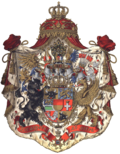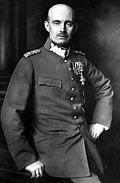List of Dukes and Grand Dukes of Mecklenburg
| Monarchy of Mecklenburg | |
|---|---|
|
Provincial/State
|
|

Grand ducal coat of arms
of Mecklenburg-Schwerin |
|

Frederick Francis IV of Mecklenburg-Schwerin
|
|
| Details | |
| Style | His Royal Highness |
| First monarch | Niklot |
| Last monarch | Frederick Francis IV, Grand Duke of Mecklenburg-Schwerin |
| Formation | 1130 |
| Abolition | 1918 |
| Appointer | Hereditary |
| Pretender(s) | Borwin, Duke of Mecklenburg |
This list of dukes and grand dukes of Mecklenburg dates from the origins of the German princely state of Mecklenburg's royal house in the High Middle Ages to the monarchy's abolition at the end of World War I. Strictly speaking, Mecklenburg’s princely dynasty was descended linearly from the princes (or kings) of a Slavic tribe, the Obotrites, and had its original residence in a castle (Mecklenburg) in Dorf Mecklenburg (Mikelenburg) close to Wismar. As part of a feudal union under German law from 1160—at first under the Saxons—Mecklenburg was granted imperial immediacy in 1348 and its princely rulers styled Dukes of Mecklenburg. Despite several partitions, Mecklenburg remained an integral state until the end of the monarchy. The First Partition of Mecklenburg came in 1234, causing the principality to lose land. Thus arose the partial principalities (lordships) of Werle, Parchim-Richenberg, Rostock and Mecklenburg. In modern times it was divided into the two (partial) duchies of Mecklenburg-Schwerin (I) and Mecklenburg-Stargard (1348–1471), Mecklenburg-Schwerin (II) and Mecklenburg-Güstrow (1555–1695), and with the Treaty of Hamburg (1701) into Mecklenburg-Schwerin (III) and Mecklenburg-Strelitz. However, the dynasty always retained feudal rights to the entire fief and the rulers of both parts of the country always had identical titles, which led to diplomatic confusion.
...
Wikipedia
